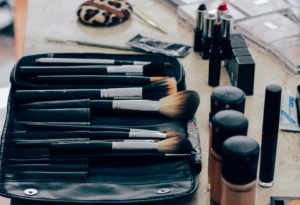If there’s one thing every woman wants, it’s great skin. But a flawless complexion doesn’t just happen. There are steps you need to take – including understanding your skin type and needs, finding the right products, and diligently following a routine – to achieve a healthy, youthful, radiant glow.
Keep reading to learn the six things you can do to encourage good skin health:
1. Keep Yourself Hydrated
There’s nothing your brain loves more than a refreshing jolt of caffeine first thing in the morning, but is that what’s best for your skin? Unfortunately too much caffeine is on the list of things to avoid alongside too much alcohol and too many soft drinks like pop, all of which can dehydrate your skin.
Healthy drinks to reach for instead include:
- Water: Our bodies typically absorb about a litre of water per hour. Drinking enough water throughout the day will keep you hydrated from the inside out, helping your skin maintain its elasticity and look its best.
- Tea: Green tea contains high levels of polyphenols, which can aid in the production of pigment protectors and slow visible signs of aging. Black tea also has polyphenols (thearubigins) and antioxidants (theaflavins) to promote good skin health.
- Juices: Juices made from 100% fruits and vegetables are a rich source of vitamins and minerals. Look for darker juices (blueberry, pomegranate, spinach, etc.), which contain more antioxidants.
Do you want to learn more about tips for dealing with specific skin conditions like acne, rosacea, and signs of aging? Click here to check out this article from AlumierMD!
2. Eat a Healthy Diet
As the saying goes, we are what we eat. Sticking to a healthy diet filled with fruits, vegetables, lean proteins, and whole grains can help you look and feel great.
Some vitamins and minerals to fill your diet with include:
- Omega-3 fatty acids, which help to reduce inflammation and decrease the frequency or severity of skin conditions like rosacea, acne, and psoriasis. Omega-3 fatty acids are especially prevalent in cold-water fish like salmon, sardines, mackerel, and cod.
- Biotin, a water-soluble vitamin that helps to regulate the production of fat and keep skin moisturized. Foods rich in biotin include egg yolks, swiss chard, and nuts.
- Vitamin E is a fat-soluble antioxidant that is stored in fat cells and then secreted to coat and protect the outer layer of your skin. Vitamin E can be found in a diverse range of foods including polyunsaturated vegetable oils, some leafy vegetables, peppers, seeds, and more.
- Vitamins B5 and A play critical roles in helping your skin cells regenerate and grow. They can be found in foods like fish, dairy and poultry products from pastured cows and chickens, broccoli, fish, mushrooms, and sweet potatoes.
- Sulfur, a less well known mineral critical for its role in collagen synthesis. Consuming enough sulfur will help to ward off wrinkles and keep your skin strong and firm. Sulfur can be found in proteins like egg yolks, fish, and poultry and plants like kale, onions, and garlic.
With so many options available, it’s easy to find foods that appeal to your taste buds and that are rich in the nutrients your skin loves.
3. Moisturize in the Morning and Evening
Daytime facial lotions typically feel lighter and are designed with an SPF. This makes it easy to wear makeup overtop without looking or feeling too greasy.
Nighttime moisturizers are richer and have plumping and polishing ingredients like retinoids and glycolic acids, which are excluded from daytime moisturizers because they can make your skin more sensitive to sun exposure.
4. Use the Right Sunscreen
Do you find yourself looking outside and thinking, “Do I really need to wear sunscreen today? It’s so cloudy and dull!”
The answer: yes.
Day-to-day UV exposure can not only increase your skin cancer risk but also enhance visible signs of aging like lines, wrinkles, and discolouration.
How can you keep your skin protected from the sun? Check out the four tips in our blog!
5. Clean Your Makeup Brushes
How often you need to clean your makeup brushes depends on how they’re used:
- For concealer and foundation brushes, aim to clean them once per week.
- Any brushes used around your eyes can be cleaned twice a month.
- All other brushes should be cleaned monthly.
To clean your makeup brushes, apply a small drop of mild shampoo in the centre of your palm. Run the brush under warm water, and gently massage the bristles into the shampoo. Be careful to avoid the base of the brush, as shampoo can soften the glue used to hold the hairs in place. Lastly, rinse and towel-dry the brushes before placing them on the counter’s edge to dry.
6. Find the Right Routine for Your Skin
There is no single skincare solution that will be right for everyone. Each person’s skincare profile is different, which is why the routines followed need to be tailored to match.
Some general ground rules include:
- Salicylic acid- or benzyl peroxide-based cleansers are best for acne-prone or oily skin.
- Milky washes and lotions are often ideal for dry, mature skin.
- Brightening treatments (like alpha hydroxyl acid products) can help address dark spots.
Work with an experienced skincare expert to determine the skincare solutions and regimen that will be right for you.
At Brampton Cosmetic, we offer a complete lineup of skincare solutions from leading providers to suit your unique needs. Contact us today to learn more!
Like this? Check out:
- Your Guide to Choosing the Right Cosmetic Clinic for Dermal Injections
- NanoLaserPeel™ vs. Microdermabrasion: Which Cosmetic Skin Treatment is Right for You?
- The 5 Questions You Need to Ask During Your Cosmetic Surgery Consultation
- Acne Treatments that Work for Teens and Adults - June 6, 2025
- Reclaim Confidence with a Tummy Tuck or Breast Lift – Brampton Cosmetic - January 14, 2025
- Meet Our New Medical Esthetician: Sandra Quiquero - August 19, 2024
- Say Hello to Smooth Skin and Goodbye to Stubble Trouble! Your Guide to Laser Hair Removal - June 21, 2024
- Your Guide to Financing Cosmetic Surgery with Brampton Cosmetic - April 10, 2024







Comments are closed.